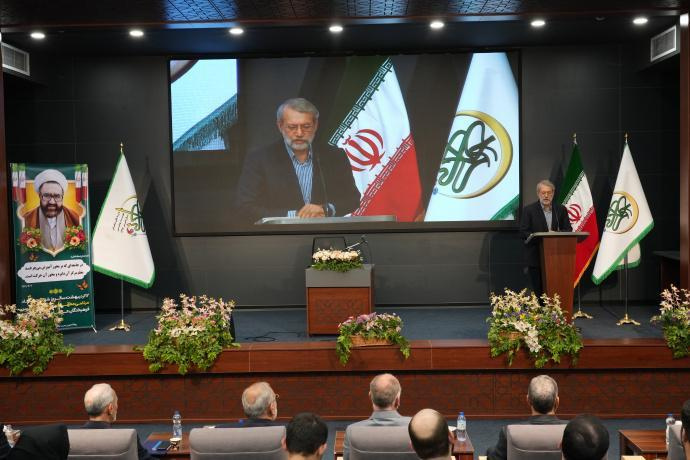Report on the Specialized Meeting on "Islamic Governance in the Thought, Works, and Intellectual Legacy of Martyr Professor Morteza Motahhari

According to the Center for Communications and International Relations of the Supreme National Defense University, a specialized meeting titled "Islamic Governance in the Thought, Works, and Intellectual Legacy of Martyr Professor Morteza Motahhari was held in the Shahid Rajai Hall of Shahid Beheshti School of Governance, commemorating the anniversary of this great thinker’s martyrdom and Teachers' Day. In this meeting, Dr. Ali Larijani, esteemed advisor to the Supreme Leader, member of the Expediency Council, and member of the Supreme Council of the Cultural Revolution, elaborated on various aspects of Motahhari's perspectives on governance.
At the beginning of the meeting, Dr. Bakhtiari, the President of Shahid Beheshti School of Governance, commemorated Teachers' Day and the memory of Martyr Motahhari. He referenced a quote from Imam Khomeini (may peace be upon him), who stated, "The works of Martyr Motahhari are universally applicable." He described this characterization by the Imam as remarkable and emphasized his recommendation to young people to turn to the works of Martyr Motahhari.
Continuing, Dr. Larijani described the character and thoughts of Martyr Professor Morteza Motahhari as multifaceted, possessing diverse scientific and intellectual dimensions. He highlighted His committed works as a sign of divine favor and emphasized the centrality of rationality in his thinking. According to Dr. Larijani, the effort to present religious thought within a framework of rational tradition and to approach Islamic concepts rationally are prominent and distinguishing features of Motahhari.
He also referred to several major and foundational axes in the intellectual framework of Martyr Motahhari, which form the basis of his views in various fields. These axes include attention to the needs of the time through a proper understanding of societal issues, a multidimensional perspective on human beings, belief in the comprehensive development of individuals in both material and spiritual aspects, and the recognition of human nature as the foundation of Islamic thought and ideology.
Dr. Larijani then specifically elaborated on Martyr Motahari’s views in the field of governance, outlining four key points from his perspective: The concept of inherent justice, which means ensuring that everyone receives their natural rights and serves as the foundation for establishing laws. Proactive freedom, which emphasizes the role of governance in facilitating the movement and progress of society. Territorial planning aimed at creating balance in the development of different regions of the country. Dual-level governance, which involves guiding society toward a to achieve governance objectives, while simultaneously managing the efficient administration of state, non-state actors
The advisor to the Supreme Leader stated that Martyr Motahhari believed that Islamic governance must simultaneously focus on both the material and spiritual growth of society while also providing the necessary deterrent tools against adversaries.
Dr. Larijani concluded by stating that Martyr Motahhari believed that the scientific-cultural theory is a precursor to various theories in the field of development and can serve as an outstanding model for justice-oriented governance.



Your Comment :